
by Imperial Systems | Dec 20, 2017 | Uncategorized
Imperial Systems Newsletter Issue 4 is the last one of the year and the best issue to date. Make sure to check out all of the articles and interview.
Click Cover To Download and Print Newsletter

CLICK THE ARTICLE TO READ





 BECCA THE EDITOR
BECCA THE EDITOR
It’s not in my official job title. It’s not what I was hired for. Underneath my ordinary day job in aftermarket sales, I have another responsibility. I am The Editor.
If you read our blog, our brochures, our newsletter, or our published magazine articles, you’ve read my work. It doesn’t have my name on it and I don’t care. Being The Editor has given me a chance to learn more about our products, our customers, and this industry than I ever would have learned in sales.
Just about every person who works here has a wealth of knowledge and a unique story to tell. Putting those things into written form is what I do. I tap into the incredible resources I have all around me. I ask a lot of questions. Sometimes I get blank stares, and occasionally I get a “why exactly are you asking me this” look with raised eyebrows. But in the end, someone always has an answer.
The best thing about my secret job as The Editor is the pride I feel when our company’s written material sounds professional, when our blog posts are helpful to someone, or when an industry magazine publishes an article. All of this represents the ideas and knowledge of many people; I put it in words and make it sound good.
In a way, that’s how everything works here at Imperial Systems. Everything, from the products we make to the newsletter you’re reading, is the work of a team.
Read more
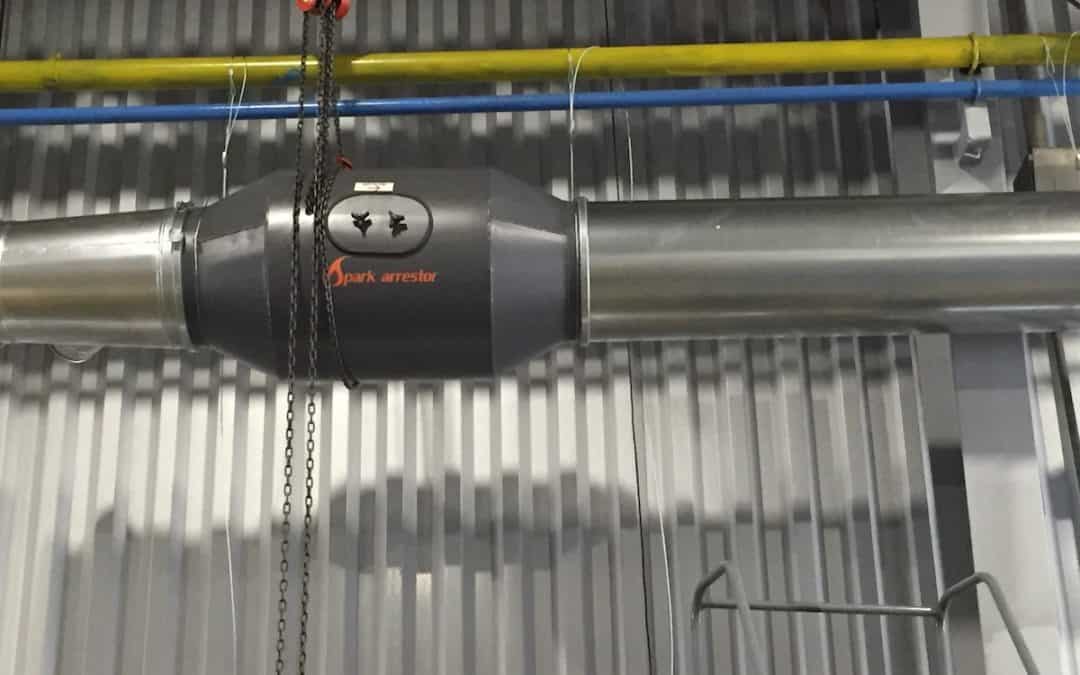
by Imperial Systems | Dec 14, 2017 | Uncategorized
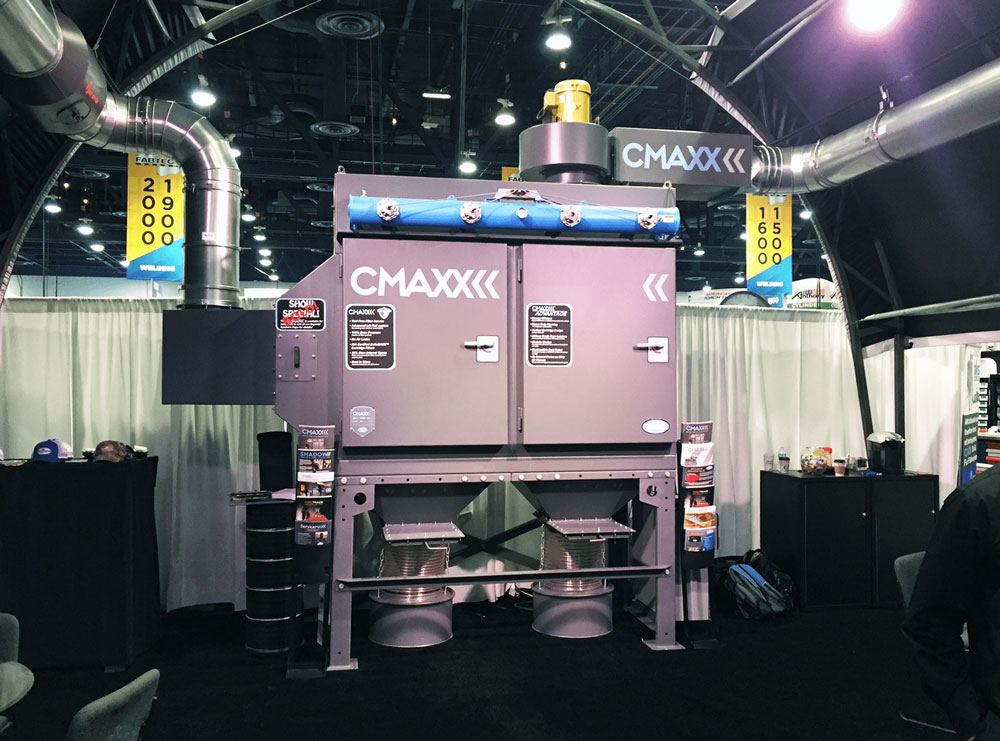
Managing weld smoke risks means dealing with very small particle size, toxic metals, and the combustibility of metal dust. Weld smoke and fumes are different from other types of dust, and a system needs to be designed to deal with it. A CMAXXTM dust and fume collection system will meet any metalworking or weld smoke control needs.
WELD SMOKE RISK: HEALTH
One of the risks of weld smoke is hexavalent chromium. This compound can cause skin sores and lung damage, and cancer of the lungs, kidneys, and other organs. Many metals are alloyed with chromium to make them corrosion-resistant.
Most of the particles in welding fumes come from the welding wire, but some of them come from the material being welded. Some of them can cause allergic reactions and an immune response called “metal fume fever”. Lead and manganese can damage the brain. Others, like hexavalent chromium and nickel, are known carcinogens and increase your risk of cancer. Learn more about welding fumes and cancer.
The particles that are put into the air as fumes from welding are extremely small. Most are smaller than one micron. This means they are small enough to get inside human cells and cause damage. This also means that welding fumes are lighter than air, especially when heated. A system for collecting these fumes must be designed to handle very small particles.
MANAGING WELD SMOKE RISK: FIRE AND EXPLOSION
Welding produces metal dust and gases that may be combustible. Some metals, such as aluminum, are very explosive as a dust. Almost all metal dusts have the potential to explode. Handling welding fumes means using appropriate fire suppression and prevention measures.
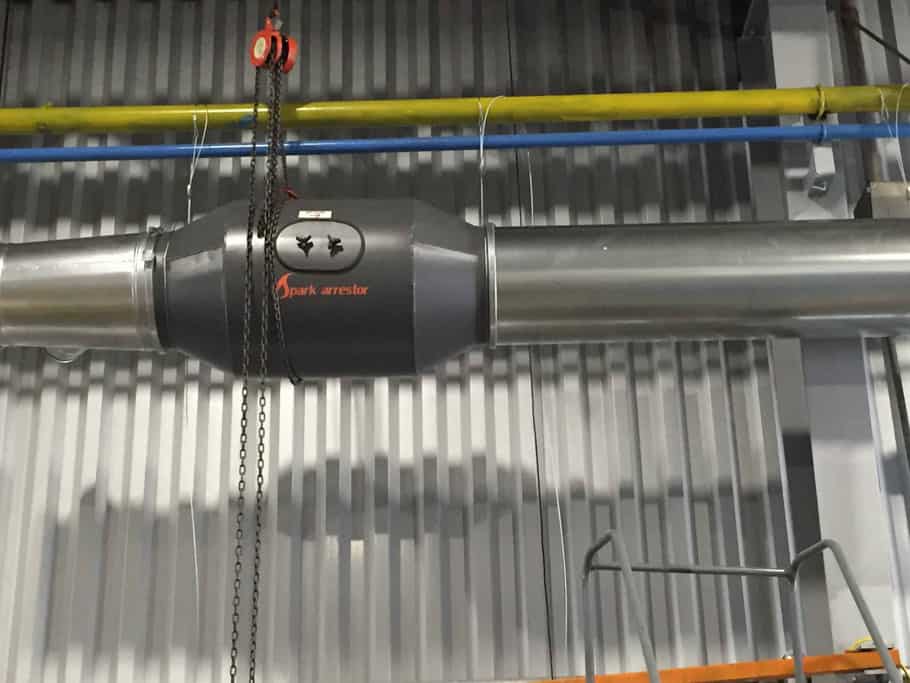
Suppressing sparks to keep them from getting into the collector can help prevent explosions from welding smoke dust. Spark Arrestors are important in keeping most sparks from getting to the collector. An explosion isolation valve can prevent a fire from traveling back through the ductwork. Chemical control systems can suppress or extinguish a flame, but only certain chemicals are approved for fires involving metal dust.
Filters can also be important for fire suppression in a welding smoke system. Filters with a fire-retardant coating they will resist burning and help control a deflagration. Some collectors are designed with filters that help isolate an explosion and keep it from causing damage inside the workplace. DeltaMAXXTM filters with fire-retardant coating will prevent a fire from occurring inside a dust collector.
HANDLING WELD SMOKE
Figuring out what type of fume extraction system to use in your facility is an important decision for managing the risks from weld smoke. Our systems engineers will consult with you to help you determine the best way to manage your weld smoke risk.
If there are not very many welders and they don’t always work at the same place, portable collectors can be a solution. They can be useful for handling point of source capture. An ambient system is designed to move a volume of air out of a large area and through filters.
For managing weld smoke, portable collectors can be easily moved around, but they are not as powerful as a larger collector. Central collectors are the most efficient for large areas, but if they are inside they take up floor space. Locating the collector outside is usually recommended for safe explosion venting.
One of the biggest advantages with an ambient system that recirculates the air back into the facility is energy cost savings. When heated or air-conditioned air is vented outside, the energy used is lost. Many businesses find that a fume collection system can pay for itself within two years with the money saved in energy costs.
CMAXXTM dust and fume collectors have proven themselves in the welding and metalworking fields. Our newest product, the SHADOWTM portable collector, gives you even more options for managing weld smoke . DeltaMAXXTM nanofiber filters are the best available material for capturing metal fumes. At Imperial Systems Inc., we are committed to helping you control your weld smoke risks.
(as seen in The Fabricator Magazine)
Read more
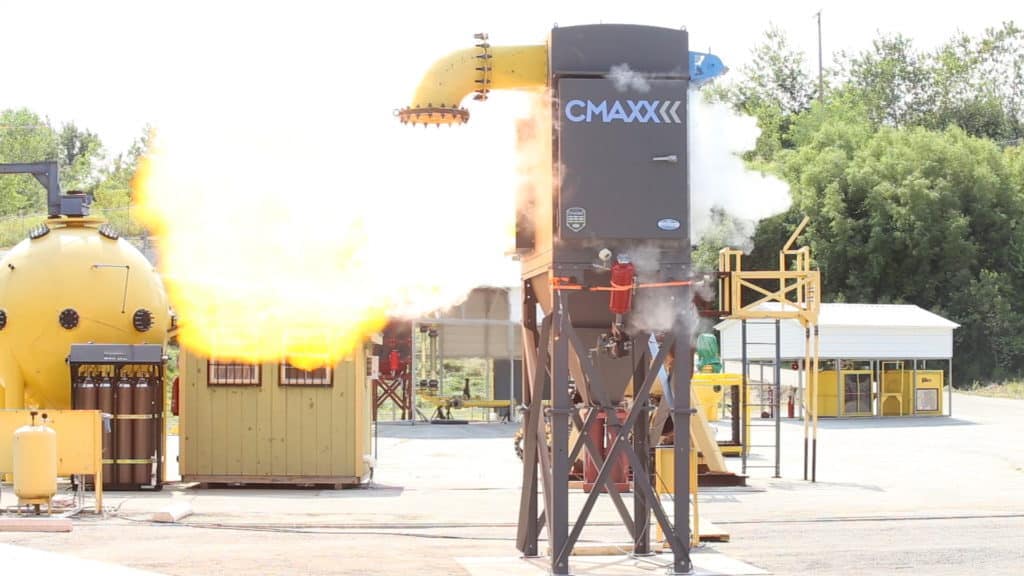
by Imperial Systems | Dec 6, 2017 | Uncategorized
An explosion inside a dust collector can be a disaster if there is no explosion venting (also called deflagration venting). Obviously, the first priority is to make sure that no sparks or heat sources have a chance to get inside the collector. However, even the best safety precautions aren’t 100% foolproof. If a dust explosion occurs in your dust collector, how will explosion relief be handled safely?
Explosion Venting Considerations
The method you choose for venting an explosion will be based on several factors:
- Location of the dust collector inside or outside the building
- Distance of the dust collector from roof or walls
- Proximity of the dust collector or vent to other structures
- Cost efficiency

Outside Installation
The first and safest method of venting a dust explosion is to have the collector located outside the building. In this case, any explosion that occurs will be vented safely with appropriate venting.
The issue with this method has to do with safety distance. Specifically, explosion relief vents must be located far enough away from anything that the energy vented might damage. Space around the dust collector, especially near the explosion vents, must be clear of anything that could be damaged or ignited.
Many areas have state and/or local regulations for fire safety and explosion venting. Locating the collector outside when possible is usually the easiest way to meet these standards.
Inside Installation
What if your dust collector must be inside the building? There are various reasons for this, depending on your system setup. For example, it’s possible that the collector must be centrally located. Also, it might need to be close to or attached to a certain piece of equipment.
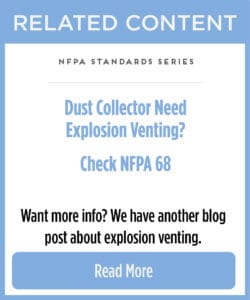 If you can’t put the collector outside, you will have to divert the energy of an explosion. The most common way to do that is to vent the explosion to the outside, either through a wall or through the ceiling. The area outside needs to be safe just like it would need to be around a dust collector, free of anything that could be damaged by the explosion. A deflector shield can redirect the explosive force in a safe direction.
If you can’t put the collector outside, you will have to divert the energy of an explosion. The most common way to do that is to vent the explosion to the outside, either through a wall or through the ceiling. The area outside needs to be safe just like it would need to be around a dust collector, free of anything that could be damaged by the explosion. A deflector shield can redirect the explosive force in a safe direction.
What happens if your dust collector is inside the building and you’re not close enough to a wall or ceiling to vent that way? This could be a very dangerous situation, with a collector inside your building and no way to get an explosion safely outside.
In this case, a flameless dust collector explosion vent may be the only safe option. While these safety devices are not cheap, they are essential for venting an explosion safely inside a facility or anywhere else that flame from the venting could be dangerous.
A flameless explosion vent design is made of a tightly wound metal mesh. It’s designed to extinguish the flame and dissipate the heat from an explosion. It takes up less space and is less expensive than other explosion protection systems. It is ATEX certified and NFPA 68 and 61 compliant.
Venting Solution Priorities
We recommend looking at explosion venting solutions in the following order, based on cost and safety:
- Locating the collector outside
- Venting the collector through a wall or ceiling
- Installing flameless venting
We also recommend always consulting your local building codes and regulations. Some areas have very specific regulations for fire safety and environmental safety.
Read more
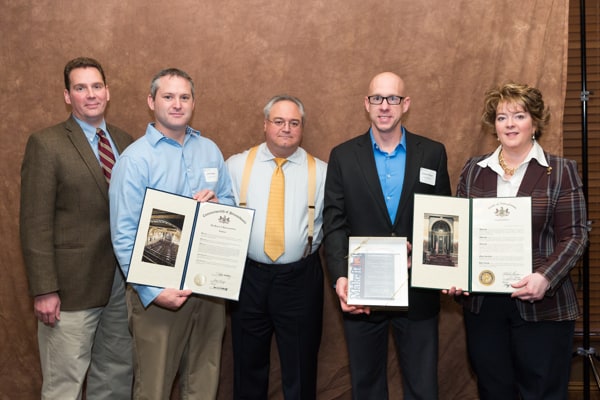
by Imperial Systems | Nov 29, 2017 | Uncategorized

The Penn-Northwest Development Corporation has chosen Imperial Systems for their local industry and spotlight in Mercer County. PNDC is a non-profit organization that recognizes companies bringing or expanding business and local jobs in Mercer County.
Imperial Systems was chosen for this recognition because of our expansion, which is expected to be completed in January 2018. By renovating and making drastic improvements, we have brought new life to an aging facility that might otherwise have ended up standing empty.
PNDC works to build economic development in Mercer County, an area which has experienced increased unemployment and skilled workers moving elsewhere. Their focus is on bringing new companies to Mercer County and supporting the growth of local companies.
Since its beginning, Imperial Systems has provided skilled trades jobs in Mercer County. As we have expanded, new employees have been brought into the shop to keep up with increasing demand, and new employees have also come in the form of equipment and aftermarket sales staff. Most of these careers support families who live right here in Mercer County.
Imperial Systems is proud to be recognized in PNDC’s Local Industry Spotlight, because we pride ourselves on keeping our business here, where it belongs. By keeping our expansion in Mercer County, we continue to support the jobs and families in this area.
PNDC’s annual report notes that Imperial Systems’ expansion is expected to add 15 more jobs and to retain 50 current local jobs.
Mercer County is home for many of our employees and their families, and we’re very proud to contribute to the growth and development of this area. Imperial Systems products will always be made in the USA and will always provide full-time work for local employees.
As we become one of the new biggest names in the dust collection industry, the number of employees needed can only be expected to grow over time. We plan to continue supporting industry in Mercer County, and appreciate the recognition from PNDC for our efforts.
Read more
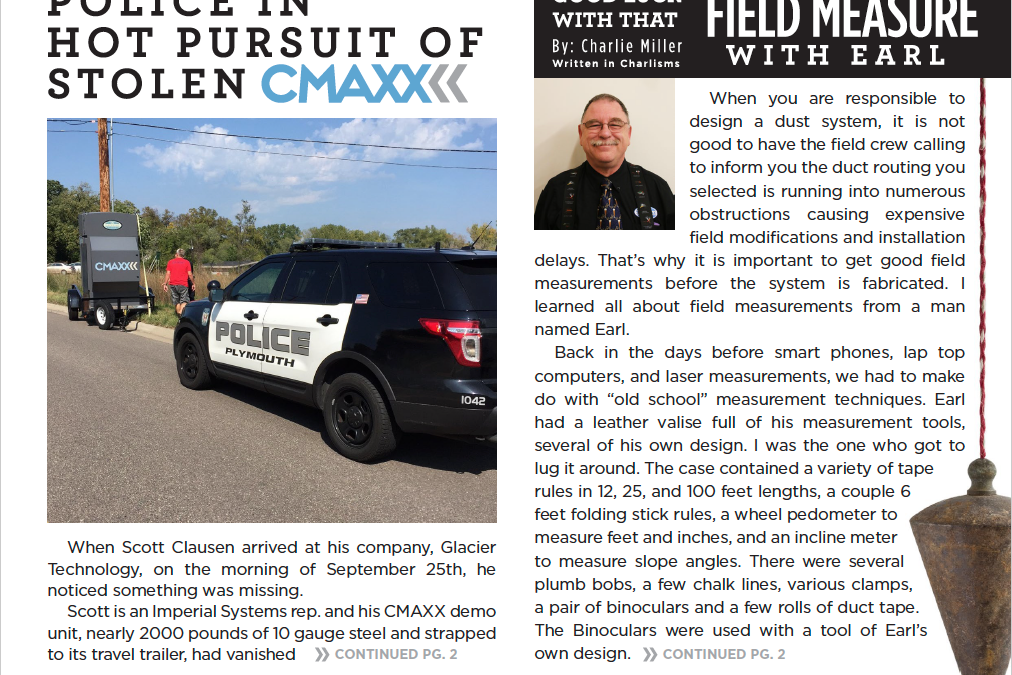
by Imperial Systems | Sep 28, 2017 | Uncategorized
The Third Issue of Dusty Jobs Newsletter. Articles include an attempt at stealing a CMAXX, Charlie with learning to Field Measure and also OSHA on their regulations on combustible dust.
Download DUSTY JOBS | Issue 3 PDF CLICK HERE
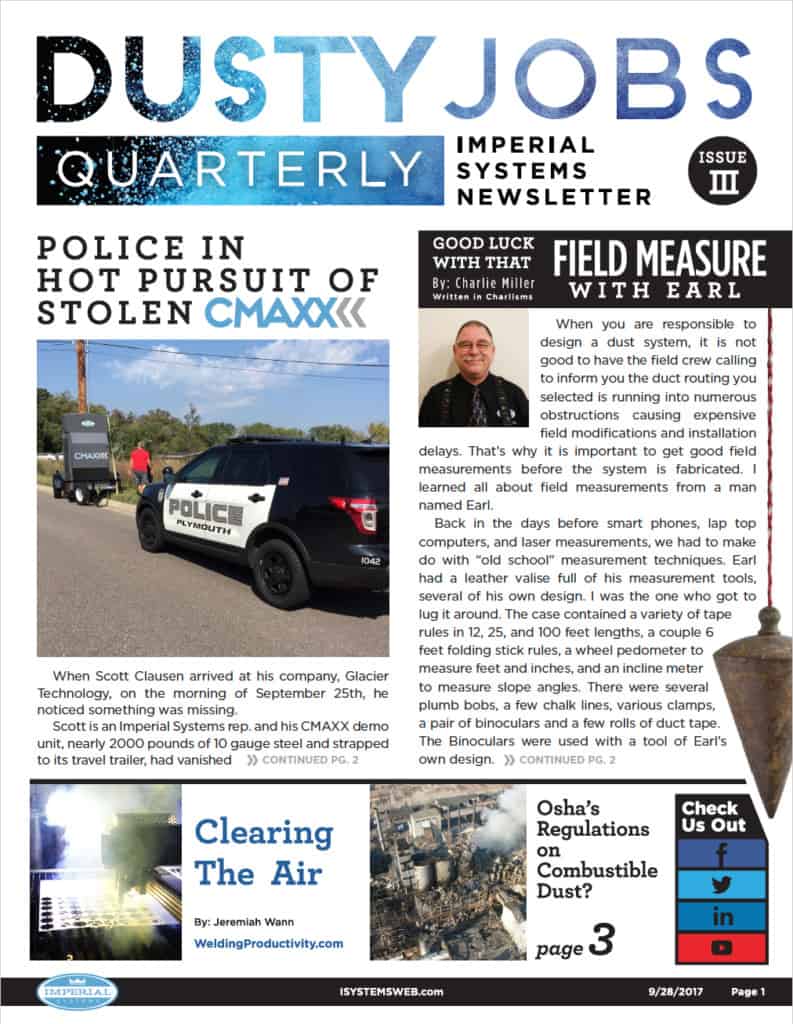
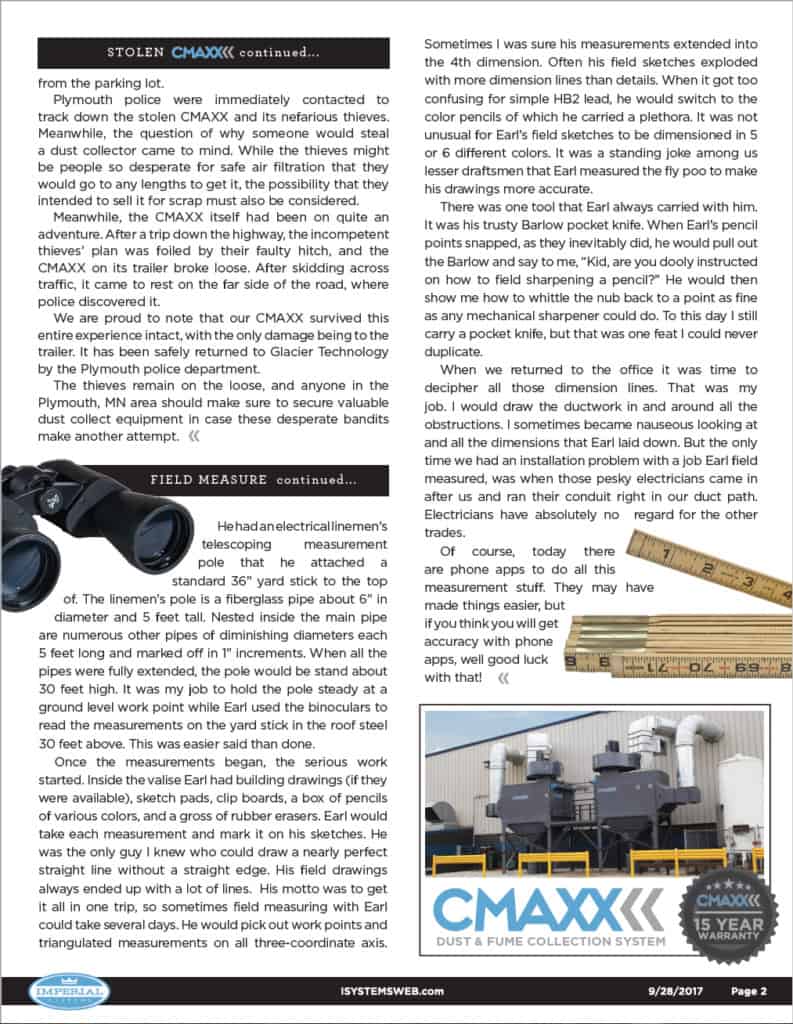
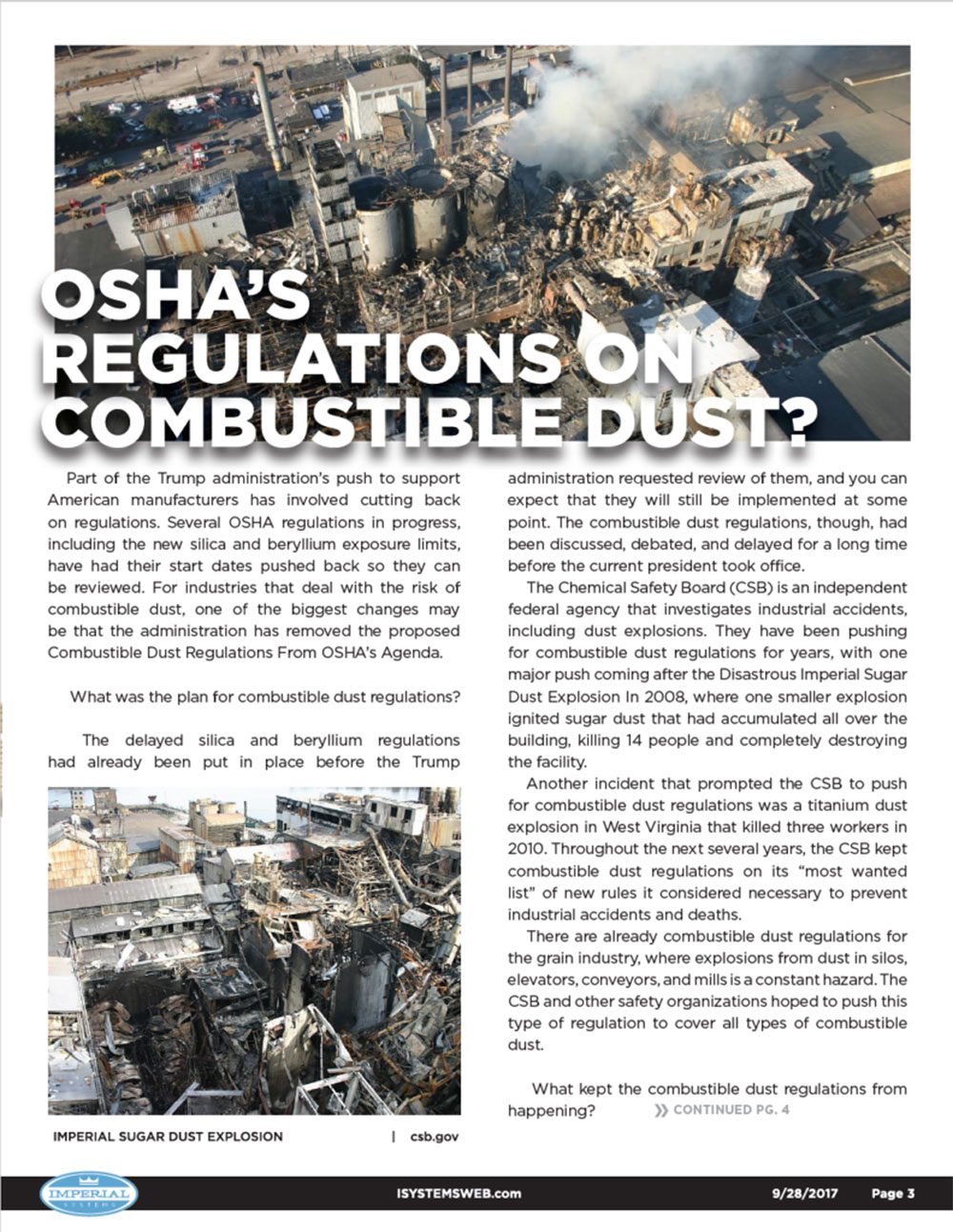
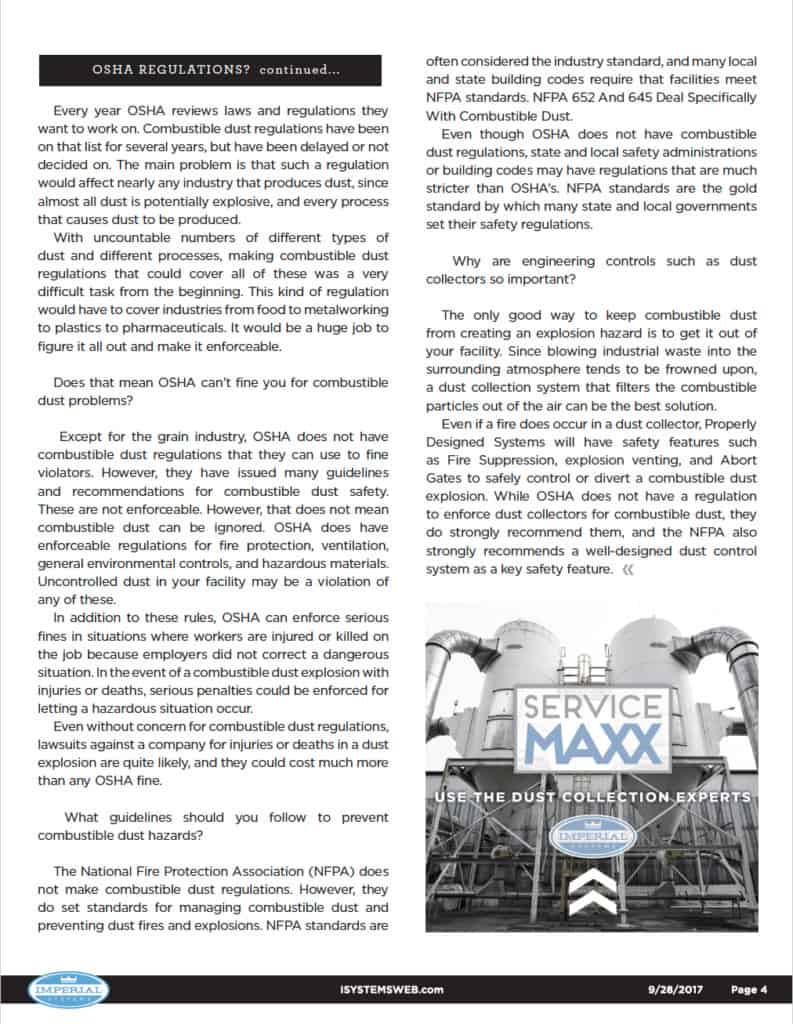
Read more




 BECCA THE EDITOR
BECCA THE EDITOR












